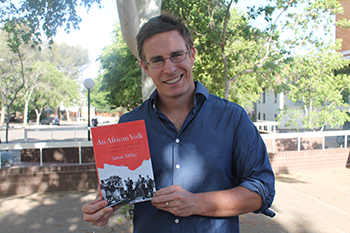Latest News Archive
Please select Category, Year, and then Month to display items
08 August 2023
|
Story EDZANI NEPHALELA
|
Photo EDZANI NEPHALELA
 Mbulelo Aven Jafta, Xhariep Municipality Corporate Services Director, and Dr Engela van Staden, Deputy Vice-Chancellor: Academic at the UFS, sign a memorandum of understanding to enrich various communities in the Xhariep Municipality areas through leadership training.
Mbulelo Aven Jafta, Xhariep Municipality Corporate Services Director, and Dr Engela van Staden, Deputy Vice-Chancellor: Academic at the UFS, sign a memorandum of understanding to enrich various communities in the Xhariep Municipality areas through leadership training.
The University of the Free State (UFS) has signed a memorandum of understanding with the South African Local Government Association (SALGA) and the Xhariep Municipality that is aimed at positively impacting communities through strategic partnerships. The organisations plan for their collaboration to make a significant difference by training 35 of their employees via the UFS Business School – 15 will undertake the Foundation Skills Short Learning Programme, and 20 the Bachelor’s degree in Management Leadership.
This joint effort will equip these employees with essential skills and knowledge and empower them to carry out their responsibilities efficiently and effectively. Rooted in the UFS’s Vision 130, this initiative fosters positive change within the community by enhancing social justice and innovation.
Dr Engela van Staden, Deputy Vice-Chancellor: Academic at the UFS, emphasised the university's dedication to human resource development and empowering individuals. “We were very excited when we got this engagement with you, and I hope it will be fruitful for you, because that’s the intention. We are also reaching out to other municipalities because we are doing it for our country, and the sooner we do it, the better the services you will deliver to people.”
Xhariep Municipality expressed gratitude for the collaboration, recognising its significance in empowering its employees. Mbulelo Aven Jafta, Corporate Services Director at the municipality, thanked the university for accepting the partnership. “As a municipality, we are interested in capacitating our employees to perform their duties optimally. It is through these partnerships that we reach our intended targets. This is the first two projects, and many more will be coming as our partnership progresses, and we intend to use this opportunity to the best of our abilities.”
Jafta said that such partnerships encourage a more interconnected and interdependent world. “As organisations work towards common goals, they create a ripple effect that can lead to a brighter and more promising future and play a vital role in shaping a positive and sustainable future.”
US author launches book at UFS on African volk
2016-10-17

Dr Jamie Miller, Postdoctoral Fellow at the
University of Pittsburgh and author of
An African Volk: The Apartheid Regime
and Its Search for Survival.
Photo: Rulanzen Martin
“I realised the importance of not just accessing the policies and political approaches of the leaders of the apartheid regime, but understanding the ideas and world views that informed them. Part of the solution to this was to learn Afrikaans.”
This is according to Dr Jamie Miller, a Postdoctoral Fellow at the University of Pittsburgh, on how he went about getting inside the mind of South Africa’s apartheid regime in order to complete his book, An African Volk: The Apartheid Regime and Its Search for Survival.
The book was launched on 11 October 2016 by the Archive for Contemporary Affairs at the University of the Free State on the Bloemfontein Campus.
Volk refers to the Afrikaner nationalist movement
The book is an ambitious new international history of 1970s apartheid South Africa. It is based on newly declassified documents and oral histories, the majority in Afrikaans, which focus on the regime’s attempts to turn the new political climate to its advantage.
The term volk refers to the Afrikaner nationalist movement, also known as Afrikanerdom. The story of Afrikaner nationalism was the medium through which the regime gained power.
Four main messages from the book
Dr Miller says there are four main messages for his readers. Firstly, the apartheid regime looked to contest and hijack new ideas and norms that formed the postcolonial world, and secondly, that we need to start thinking more seriously about the Cold War in terms of domestic politics, not just geopolitics.
Thirdly, South Africa should be integrated into histories of the global South, and lastly, we should conceptualise the apartheid regime by looking at it not just as an imperial holdover, but also by looking at what was happening in the world in the time period in question.